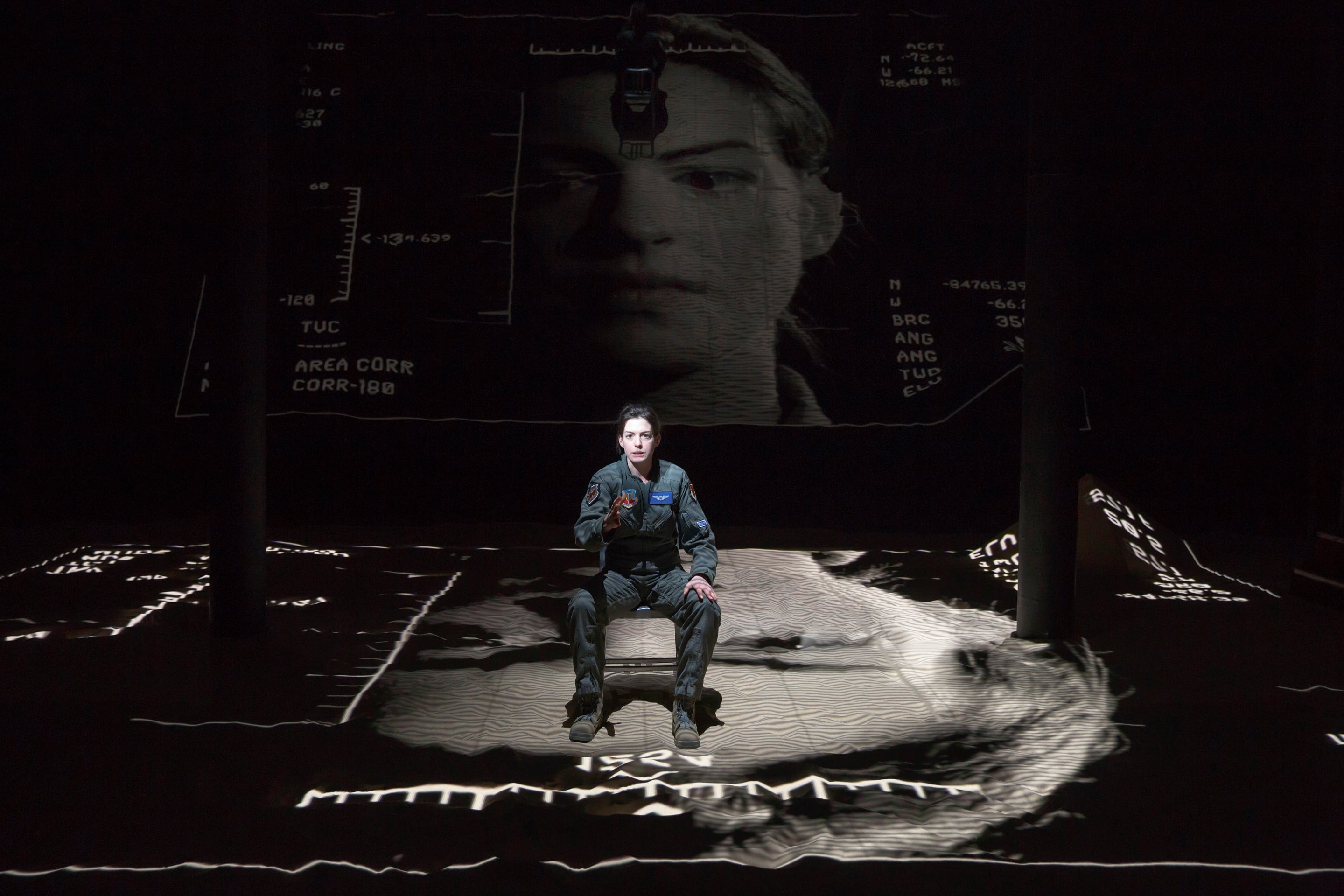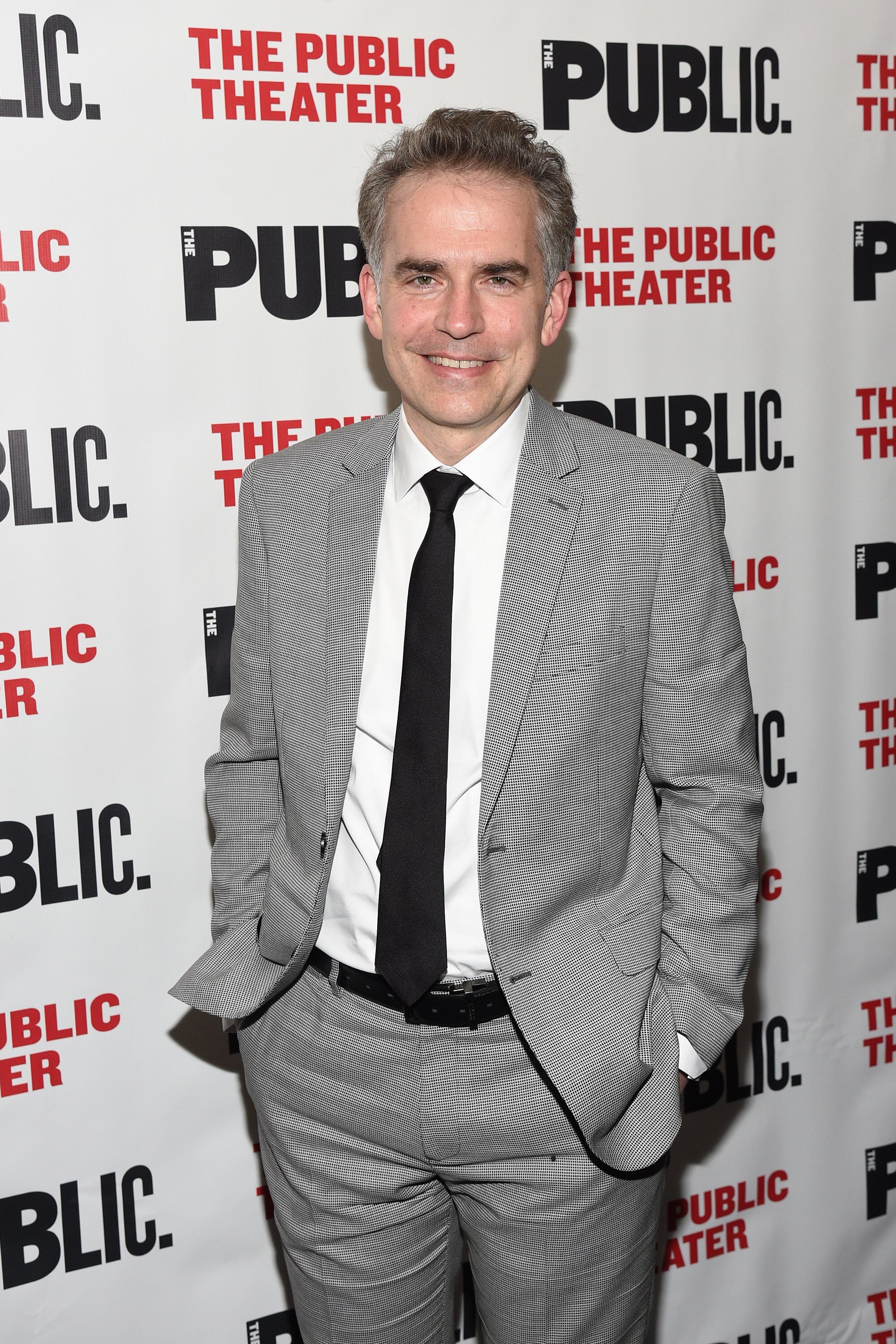Before she arrived, she'd already impressed at least one officer with her commitment to the part.
"She drove herself to Creech [Air Force Base] — without her manager, without any escort, without us," said Col. Jim Cluff, head of 432nd Wing and 432nd Air Expeditionary Wing. "She wanted to drive the road on her own, to get a feel of what people feel like when they drive up into the desert. I thought that was kind of unique."
Hathaway spent a day at the base, learning proper terminology and meeting with pilots. She also spent time at Nellis Air Force Base, Nevada, before the late-April launch of "Grounded" at New York City's off-Broadway Public Theater, where she serves as a trustee.
![Hathaway bravely flies solo in Grounded [ID=27583027]](/Portals/_default/Skins/PrestoLegacy/CommonCss/images/smartembed.png) The play's one-month run, which ends ended May 24, marked the highest profile performance of writer George Brant's work, which debuted in 2012. His research was less formal — from newspaper articles, mostly — and stemmed from an interest in the RPA wing's daily schedule.
The play's one-month run, which ends ended May 24, marked the highest profile performance of writer George Brant's work, which debuted in 2012. His research was less formal — from newspaper articles, mostly — and stemmed from an interest in the RPA wing's daily schedule.
"The pilots were going home at night, after 12-, 14-hour shifts," Brandt he said. "That was very new, that mode of fighting war. What does that do to the psyche, to have to make those types of [emotional] shifts daily?"
Brant's work rarely touches on military issues. Aside from "Grounded," his most well-known piece may be "Elephant's Graveyard," loosely based on the strange-but-true 1916 lynching of a circus elephant in Tennessee.
He ran an early draft of "Grounded" by a retired lieutenant colonel, he said, and got some basic advice, mostly in the form of, "I know you're probably not going to change this, but here's how it actually works."

Production elements designed by acclaimed director Julie Taymor support Anne Hathaway's one-woman performance in "Grounded."
Photo Credit: Joan Marcus/The Public Theater
The tale of an aviator known simply as "the Pilot" keeps an actress on stage, alone, for about 75 minutes. She recounts her love of and dedication to her career and her comrades, and she tells of a the unlikely love affair that results in pregnancy, grounding and her to RPA duties in the desert.
Hathaway, whose media representative did not respond to multiple interview requests, had been seeking a military-related role, Brant said, and became aware of the play through its positive press.

Playwright George Brant attends the "Grounded" Party at The Public Theater on April 24 in New York City.
Photo Credit: Bryan Bedder/Getty Images
Soon, the Public Theater was on board, as was director Julie Taymor, known for helming "The Lion King" on Broadway. While previous productions have featured little in the way of props beyond a flight suit, this one includes included multiple projections surrounding Hathaway's pilot, from a runway to a cemetery to a simulated RPA control-room monitor.
"There's a huge black mirror on an angle where the pilot often looks up and sees herself in some kind of void," Brant said. "That mirror serves as the night sky; sometimes there are stars projected onto it."
Story and substance
Production elements weren't the only changes made to the performance: Brant said he took suggestions from Hathaway based on her Nevada trip to update the material, including tweaks to the terminology. In a New York Times interview, Hathaway even corrected herself when she used the word "drone" while describing a simulator she'd flown at Creech.
"I thought Miss Hathaway was very genuine in her desire to get things right," Cluff said. "She was very genuine in her desire to learn about the Air Force, and not just about the RPA business, but also about the fighter pilot business. ... I thought she did a phenomenal job in portraying a female fighter pilot. She had the nuances down."
![Welsh disputes blogger s account of Creech visit [ID=27582673]](/Portals/_default/Skins/PrestoLegacy/CommonCss/images/smartembed.png) While Hathaway is set to leave the pilot's seat has left the pilot's seat, "Grounded" flies forward, debuting in Germany and Sweden this year. Regardless of the setting, Brant said the response from aviators has been positive, with some actresses receiving pilots' wings, a flight suit, even a helmet from appreciative audience members.
While Hathaway is set to leave the pilot's seat has left the pilot's seat, "Grounded" flies forward, debuting in Germany and Sweden this year. Regardless of the setting, Brant said the response from aviators has been positive, with some actresses receiving pilots' wings, a flight suit, even a helmet from appreciative audience members.
"The first preview [at the Public Theater], the whole front row was all veterans," Brant said. "To have your first audience be the one you're trying the hardest for. Particularly in the first row. I don't know how she got through it, but she did."
Kevin Lilley is the features editor of Military Times.





